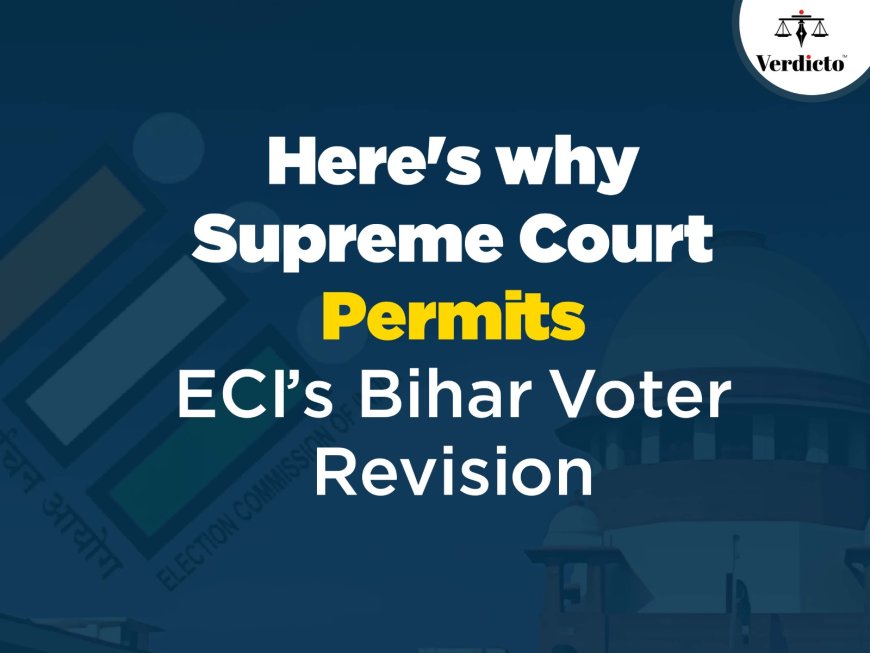“Democracy is for the people, by the people, and of the people.” This oft-repeated principle of democratic governance is the cornerstone of India’s electoral system. As Bihar gears up for the 2025 Vidhan Sabha elections, the Election Commission of India (ECI) has launched a Special Intensive Revision (SIR) of electoral rolls — a critical legal and procedural overhaul aimed at ensuring a free, fair, and inclusive election.
Why Special Intensive Revision (SIR)?
For the first time since 2003, the ECI has invoked its powers under Article 324 of the Constitution and Section 21 of the Representation of the People Act, 1950 to initiate a Special Intensive Revision in Bihar. The move comes as part of a broader effort to cleanse the electoral rolls of discrepancies, eliminate ineligible entries, and ensure that every eligible citizen is properly enrolled. The qualifying date for the revision is 01.07.2025.
Legal Backbone
Section 21 of the RPA, 1950 mandates that electoral rolls be revised before every general or bye-election. The law also empowers the Commission to carry out special revisions at any time for recorded reasons. The 2025 Bihar Assembly election qualifies as such an occasion, particularly given the two-decade gap since the last intensive revision.
Key Highlights of the ECI’s Directive
The ECI’s communique dated 24th June 2025 (No. 23/2025-ERS Vol.II) outlines the following key measures:
1. House-to-House Enumeration
Booth Level Officers (BLOs) will conduct physical verification by distributing Enumeration Forms to every household. These forms can also be downloaded online. The BLOs will collect signed forms along with supporting documents.
2. Stringent Verification of New Electors
New applicants, including those shifting from outside Bihar, must now submit a Declaration Form alongside Form 6/Form 8 to validate their claims.
3. Evidence-Based Inclusion
Electors enrolled after the 2003 revision must furnish documentary proof. Recognized documents include:
o Birth certificates
o Passports
o Educational certificates
o Govt-issued IDs pre-dating 1987
o Land/property allotment documents
o Caste certificates
o Forest Rights and National Register of Citizens (where applicable)
4. Vulnerable Groups to Get Priority
BLOs are instructed to especially support senior citizens, PwDs, the poor, and other vulnerable populations to avoid disenfranchisement.
5. Polling Booth Rationalisation
The ERO must ensure that no polling booth houses more than 1,200 voters, unless specially permitted. Redefining polling station boundaries to avoid overlap is also mandated.
6. Administrative Safeguards
The Chief Secretary of Bihar must ensure that all positions such as DEO, ERO, AERO, and BLO are adequately staffed. No transfers can occur without prior ECI approval during the SIR period.
Controversies & Criticism
The stringent documentation requirements — especially for those not listed in the 2003 electoral rolls — have drawn criticism from opposition parties. They allege that this could potentially disenfranchise sections of the population lacking adequate paperwork, despite their long-term residence.
However, the ECI maintains that these measures are not exclusionary but are in line with its constitutional mandate under Article 326 to safeguard the universal adult franchise by ensuring that only eligible citizens vote.
Progress So Far
As per the latest press note by ECI (ECI/PN/254/2025, dated 15.07.2025), an impressive 86.32% of voters have already submitted their Enumeration Forms. Out of 7,89,69,844 total electors in Bihar, forms from 6,81,67,861 voters have been collected — signaling strong ground-level implementation.
The Democratic Mandate: Not Just Legal, But Moral
This Special Intensive Revision isn’t just a bureaucratic exercise — it’s an affirmation of India’s constitutional values. The Preamble of the Constitution speaks of justice, liberty, equality, and fraternity. These ideals begin with empowering the citizen with the right to vote.
The SIR process ensures that every legitimate citizen’s voice is counted, while mechanisms are in place to weed out fraudulent entries that could distort democratic outcomes.
As Bihar stands at the threshold of another pivotal state election, the SIR may well become a model for other states, reinforcing the Election Commission’s role not just as a constitutional body, but as the guardian of India’s democratic soul.
This report was authored by Adv. Agreya Pratap and edited by the Verdicto News Desk. At Verdicto, we strive to bring you sharp legal insights and grounded coverage where law meets journalism.
📌 Follow us on YouTube, Instagram, and Twitter for more updates.








